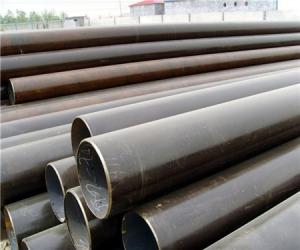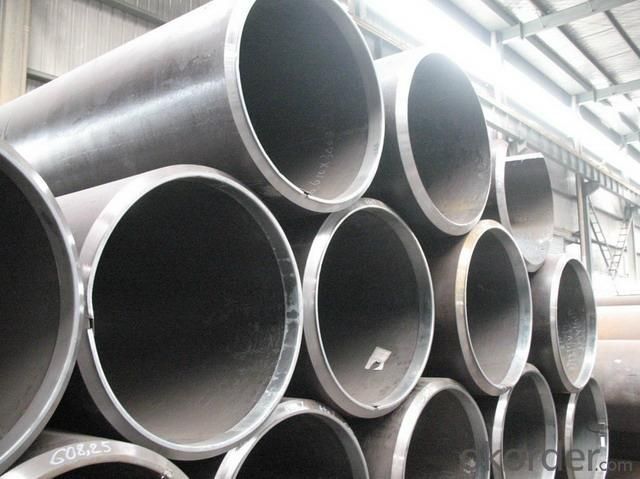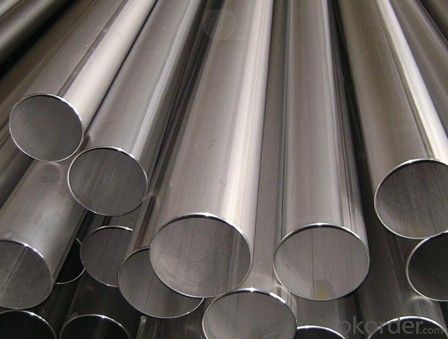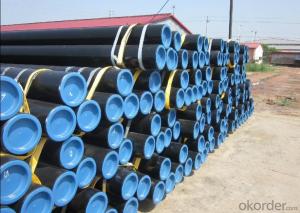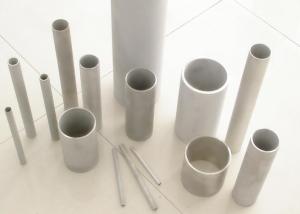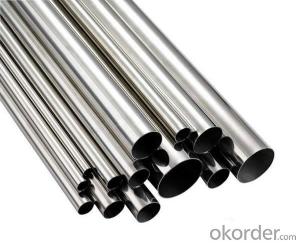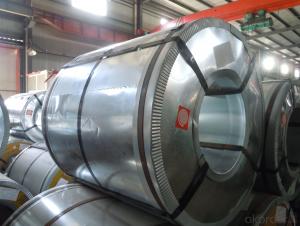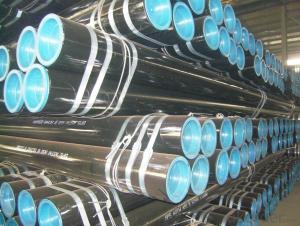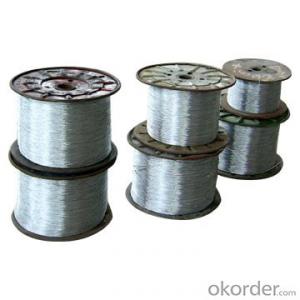Hot Dipped Galvanized Pipe manufacturer
- Loading Port:
- China Main Port
- Payment Terms:
- TT or LC
- Min Order Qty:
- 30 m.t.
- Supply Capability:
- 12000 m.t./month
OKorder Service Pledge
OKorder Financial Service
You Might Also Like
1、Structure of Seamless Pipe ASTM A106/53:
Standard: ASTM A53, BS1387, GB3091
● Application: To be used for conveying gas, water and
structural purpose
● Main Steel Tube Grade: A, B. Q195, Q215, Q235
2、Main Features of the Seamless Pipe ASTM A106/53:
• High manufacturing accuracy
• High strength
• Small inertia resistance
• Strong heat dissipation ability
• Good visual effect
• Reasonable price
3、Seamless Pipe ASTM A106/53 Specification:
Standard | GB, DIN, ASTM ASTM A106-2006, ASTM A53-2007 |
Grade | 10#-45#, 16Mn 10#, 20#, 45#, 16Mn |
Thickness | 8 - 33 mm |
Section Shape | Round |
Outer Diameter | 133 - 219 mm |
Place of Origin | Shandong, China (Mainland) |
Secondary Or Not | Non-secondary |
Application | Hydraulic Pipe |
Technique | Cold Drawn |
Certification | API |
Surface Treatment | factory state or painted black |
Special Pipe | API Pipe |
Alloy Or Not | Non-alloy |
Length | 5-12M |
Outer Diameter | 21.3-610mm |
Grade | 20#, 45#, Q345, API J55, API K55, API L80, API N80, API P110, A53B |
Standard | ASME, ASTM |
4、Packaging & Delivery
Packaging Details: | seaworthy package,bundles wrapped with strong steel strip |
Delivery Detail: | 15-30days after received 30%TT |
5、FAQ of Seamless Pipe ASTM A106/53:
①How is the quality of your products?
Our products are manufactured strictly according to national and internaional standard, and we take a test
on every pipe before delivered out. If you want see our quality certifications and all kinds of testing report, please just ask us for it.
Guaranteed: If products’ quality don’t accord to discription as we give or the promise before you place order, we promise 100% refund.
②How about price?
Yes, we are factory and be able to give you lowest price below market one, and we have a policy that “ for saving time and absolutely honest business attitude, we quote as lowest as possible for any customer, and discount can be given according to quantity”,if you like bargain and factory price is not low enough as you think, just don’t waste your time.Please trust the quotation we would give you, it is professional one.
③Why should you chose us?
Chose happens because of quality, then price, We can give you both.Additionally, we can also offer professional products inquiry, products knowledge train(for agents), smooth goods delivery, exellent customer solution proposals.Our service formula: good quality+good price+good service=customer’s trust
SGS test is available, customer inspection before shipping is welcome, third party inspection is no problem.
6、Seamless Pipe ASTM A106/53 Images:
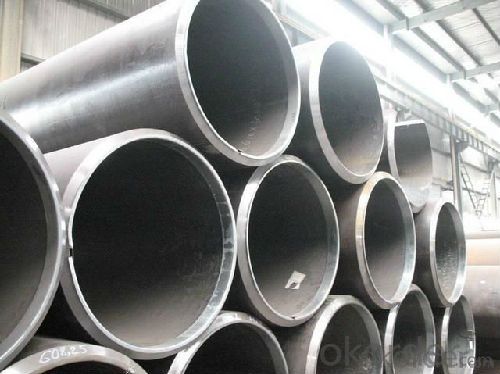
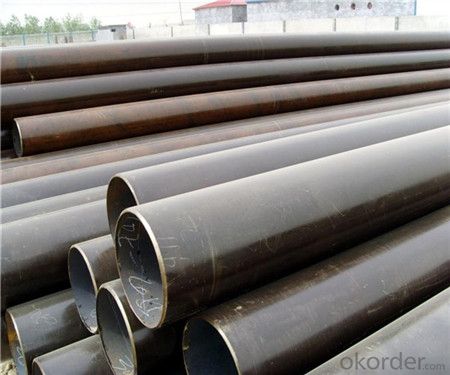
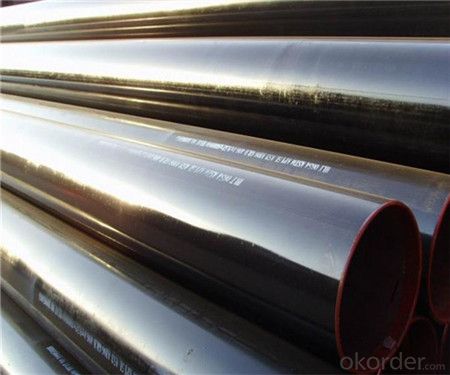
- Q: What are the different types of supports used for steel pipes in buildings?
- There are several different types of supports that are commonly used for steel pipes in buildings. 1. Pipe Hangers: These are specifically designed to support the weight of the pipe and are usually made of metal or plastic material. Pipe hangers are attached to the building structure and hold the pipe in place, preventing it from sagging or moving. 2. Pipe Clamps: These are used to secure the pipe to a wall or other structural element. Pipe clamps typically consist of a metal band that wraps around the pipe and is then secured to the structure with bolts or screws. They provide stability and prevent the pipe from shifting or vibrating. 3. Pipe Shoes: These are support devices that are installed underneath the pipe to distribute the weight evenly and provide additional support. Pipe shoes are typically made of metal or rubber and can be attached to the building structure or embedded in concrete foundations. 4. Pipe Guides: These are used to guide the movement of the pipe and prevent it from shifting or bending excessively. Pipe guides are usually made of metal or plastic and are installed at specific intervals along the length of the pipe. 5. Pipe Rollers: These are used to support horizontal pipes and allow for expansion and contraction due to temperature changes. Pipe rollers are typically made of metal and consist of a series of rollers that the pipe rests on. They allow the pipe to move freely without causing damage to the building structure. It is important to select the appropriate type of support based on the specific requirements of the steel pipe and the building structure. Properly supporting steel pipes in buildings ensures their stability, durability, and overall safety.
- Q: Can steel pipes be used for steam applications?
- Yes, steel pipes can be used for steam applications. Steel pipes are known for their high strength and durability, making them suitable for carrying steam at high temperatures and pressures. They are resistant to corrosion and can withstand the harsh conditions of steam systems, making them a popular choice in various industries such as power generation, oil and gas, and chemical processing.
- Q: Hot galvanized steel pipe for use?
- 1, galvanized layer uniformity: steel pipe sample in copper sulfate solution immersion 5 times continuously, must not turn red (copper plated)2, surface quality: galvanized steel pipe surface should be complete galvanized layer, must not have plating on the black spots and bubbles exist, allow little rough surface and local zinc tumor exists.3, galvanized layer weight: according to the requirements of the buyer, galvanized steel pipe can be used for zinc layer weight determination, its average value should be not less than 500g/ square meters, and any sample shall not be less than 480g/ square meters.
- Q: What are the main aspects of precision steel tubes?
- Products according to their application areas are divided into: automotive, precision machinery tubes; power plants, nuclear power tubes; titanium and titanium alloy tubes; chemical tubes; varieties include colored, black; seamless; welding; general and special-shaped
- Q: Are steel pipes suitable for use in food processing industries?
- Yes, steel pipes are suitable for use in food processing industries. Steel pipes are highly durable, resistant to corrosion, and can withstand high temperatures and pressures, making them ideal for transporting various food products and fluids. Additionally, steel pipes are easy to clean, maintain hygiene standards, and comply with food safety regulations, making them a reliable choice for the food processing industry.
- Q: How are steel pipes used in the manufacturing of ships?
- Steel pipes are used in the manufacturing of ships for various purposes, including structural support, fluid transportation, and ventilation systems. They are commonly used to create the framework of the ship, providing strength and stability. Additionally, steel pipes are used to transport fluids such as water, oil, and gas throughout the vessel. They are also utilized in the ship's ventilation system to ensure proper air circulation and maintain a safe environment for crew members.
- Q: Can steel pipes be used in the automotive industry?
- Yes, steel pipes can be used in the automotive industry. They are commonly used for various applications such as exhaust systems, fuel lines, and structural components due to their strength, durability, and resistance to heat and corrosion.
- Q: How do steel pipes handle seismic activities?
- Steel pipes are highly durable and resistant to seismic activities. Their strong and flexible nature allows them to withstand the ground shaking during earthquakes without compromising their structural integrity. Steel pipes are designed to absorb and distribute the energy generated by seismic waves, minimizing the potential damage caused by earthquakes. Additionally, their high strength-to-weight ratio makes them ideal for withstanding the lateral forces and ground movements associated with seismic activities.
- Q: Can steel pipes be used for underground utility lines?
- Yes, steel pipes can be used for underground utility lines. Steel pipes are commonly used for various underground applications, including utility lines for water, gas, and sewage. They are durable, strong, and resistant to corrosion, making them suitable for long-term use in underground environments. Additionally, steel pipes can be easily welded and connected, allowing for efficient installation and maintenance.
- Q: How are steel pipes used in the manufacturing of irrigation systems?
- Steel pipes are commonly used in the manufacturing of irrigation systems due to their durability, strength, and resistance to corrosion. These pipes are used to transport water from a water source to the fields or crops, ensuring a reliable and efficient irrigation process. The steel pipes also provide stability and support to the system, allowing for the proper distribution of water to the desired areas.
Send your message to us
Hot Dipped Galvanized Pipe manufacturer
- Loading Port:
- China Main Port
- Payment Terms:
- TT or LC
- Min Order Qty:
- 30 m.t.
- Supply Capability:
- 12000 m.t./month
OKorder Service Pledge
OKorder Financial Service
Similar products
Hot products
Hot Searches
Related keywords
